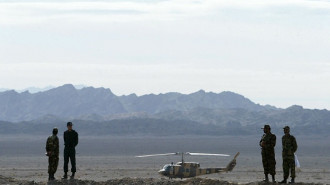Iran, US diplomats meet as Trump weighs nuclear deal
Senior Iranian and US officials met each other for the first time on Wednesday as envoys race to save the nuclear deal from a skeptical Donald Trump.
The landmark nuclear accord, agreed under the presidency of Barack Obama in 2015, saw international sanctions eased in exchange for stringent controls on Iran's nuclear programme and closer IAEA inspections.
Trump must decide by October 15 whether to certify that Iran is complying with the pact, a decision which could kill the agreement.
The US Congress would then have 60 days to decide whether to reimpose sanctions on Iran.
US Secretary of State Rex Tillerson and Iran's Foreign Minister Mohammad Javad Zarif met as parties to the 2015 accord at an EU-hosted event alongside the UN General Assembly.
EU foreign policy chief Federica Mogherini put the bravest possible face on the encounter, stressing that Iran and the great powers agree the deal is "delivering."
But Tillerson said the discussion had been a political one and that even if Iran is in "technical" compliance with the pact, "significant differences" remain.
"It was not a technical discussion, it was a political discussion of the political aspects," Tillerson said.
"So we had a very open and candid exchange between all of the parties to that agreement," he added, describing the meeting as "useful" but inconclusive.
Lost opportunity
Trump has denounced the deal as an "embarrassment" to the United States and has accused Iran of breaking it in "spirit" by arming militant groups and destabilising the region.
And, in particular, he objects to the "sunset clause" that would see Iran resume some enrichment from 2025.
Tillerson argued that the agreement implied that it would lead to a more stable Middle East and criticised Iran for propping up the "horrible" regime of Syria's Bashar al-Assad and carrying out missile tests.
While European diplomats share these concerns they are becoming exasperated by this argument, insisting the agreement was designed solely to prevent Iran from getting nuclear weapons.
"There is no need to renegotiate parts of the agreement because the agreement is concerning a nuclear program and as such is delivering," Mogherini said.
Addressing the UN assembly a day after Trump appeared on the same podium to attack Iran, Rouhani warned the fate of the deal cannot be decided by "one or two countries."
"It will be a great pity if this agreement were to be destroyed by rogue newcomers to the world of politics. The world will have lost a great opportunity," he said.
"By violating its international commitments, the new US administration only destroys its own credibility."
Trump said on Wednesday he had made his decision but was not yet ready to reveal it.
Tillerson told reporters he was aware that a decision had been made, but that Trump had even refused to tell British Prime Minister Theresa May what it is.

![Palestinians mourned the victims of an Israeli strike on Deir al-Balah [Getty]](/sites/default/files/styles/image_684x385/public/2024-11/GettyImages-2182362043.jpg?h=199d8c1f&itok=xSHZFbmc)


![The law could be enforced against teachers without prior notice [Getty]](/sites/default/files/styles/image_684x385/public/2178740715.jpeg?h=a5f2f23a&itok=hnqrCS4x)
 Follow the Middle East's top stories in English at The New Arab on Google News
Follow the Middle East's top stories in English at The New Arab on Google News
![Fakhrizadeh [AFP] Fakhrizadeh [AFP]](/sites/default/files/styles/image_330x185/public/media/images/774C39F7-8F7A-4D67-B998-27D102FCB4A7.png?h=d1cb525d&itok=j9eGvunV)

